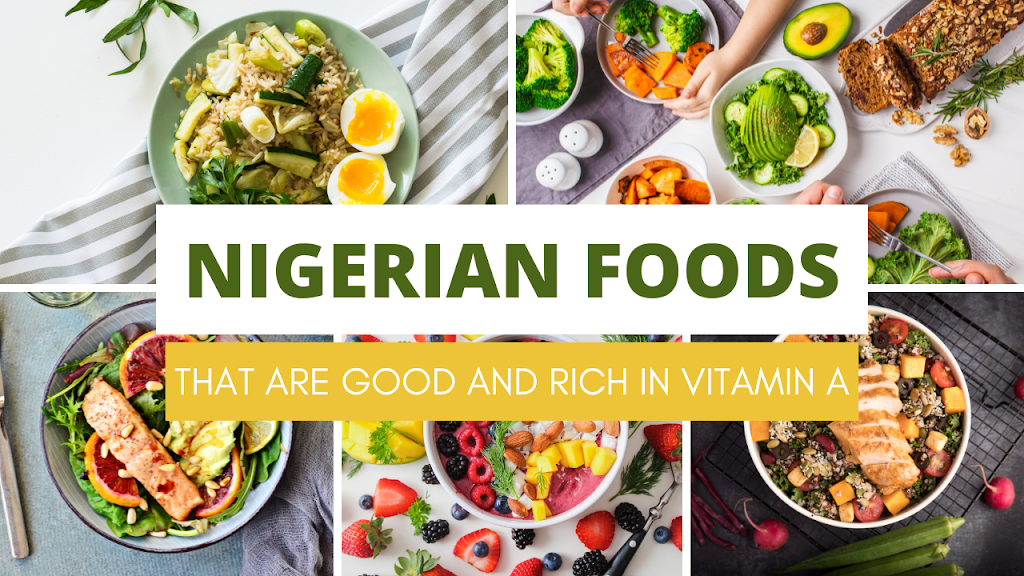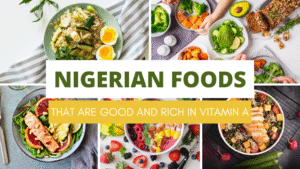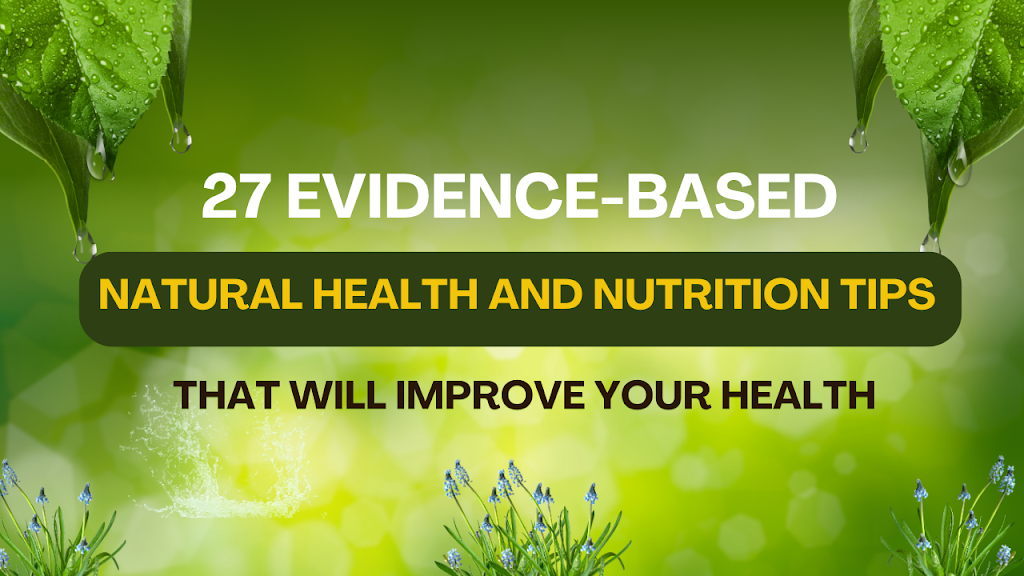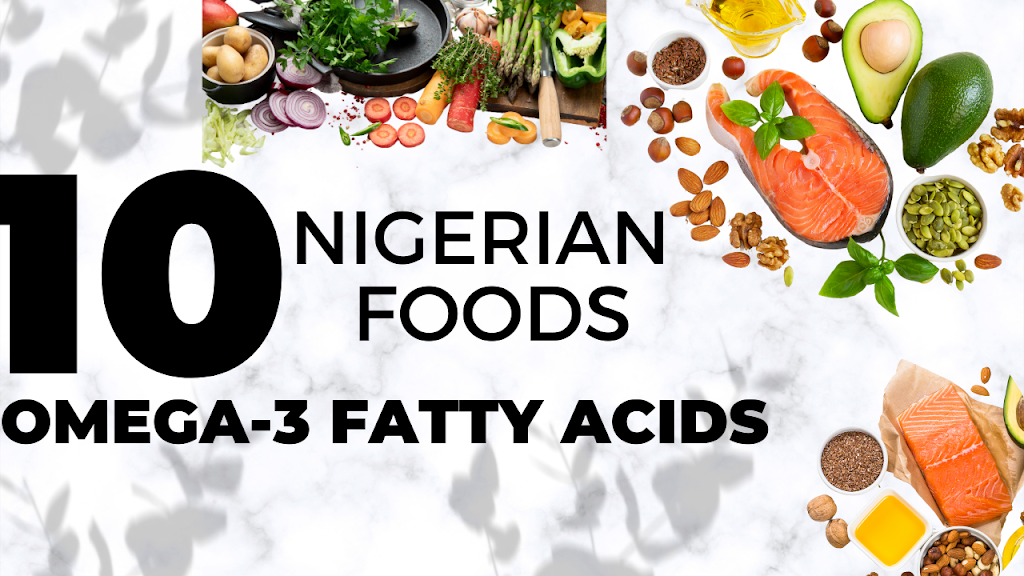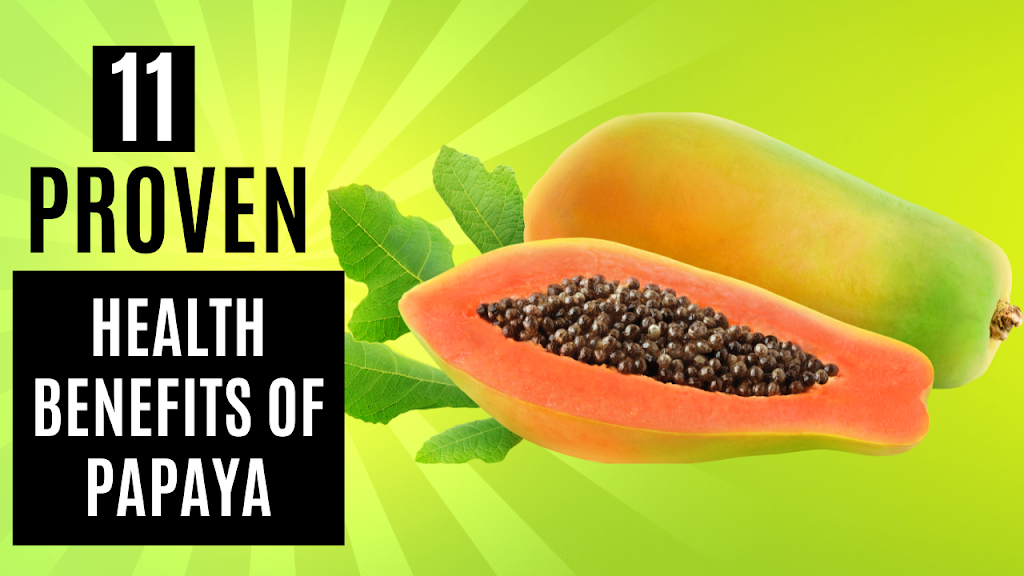Vitamin A is one of the most essential vitamins that we need
to live healthily as humans and as Nigerians, we need to eat more of it. The
recommended daily amount of vitamin A is 700 micrograms (mcg) for women and 900
micrograms (mcg) for men.
As Nigerians, we tend to ignore the usefulness of vitamins in
our meals and instead focus on meals that give instant energy. Unfortunately,
these foods contain a lot more carbohydrates than vitamins.
Vitamins should not be ignored because they are critical to
our health and well-being. They affect our skin, bones, organs, and immune
system and help perform hundreds of body functions.
The general rule is if a meal contains 20% or more of a
nutrient per serving, it is considered high in that nutrient.
What is Vitamin A?
Vitamin A is a fat-soluble vitamin essential for various bodily
functions. It plays a key role in maintaining healthy vision, supporting the
immune system, promoting skin health, and helping cells function properly.
Recommended intake of vitamin A
There are
main types
Preformed vitamin A: This comes in
the form of retinol and is present in animal-based food sources, including
meat, fish, poultry, and dairy products.
Provitamin A: This
comes in the form of carotenoids, mainly beta carotene. It is present in
plant-based foods, such as fruits and vegetables.
To aid the absorption of vitamin A, a person needs to
include some fat in their diet. It is also important not to overcook foods, as
this
the amount of vitamin A in them.
Remember: Vitamin A is also important for cell
growth, reproduction, and the maintenance of healthy organs. Deficiency can
lead to problems such as night blindness, weakened immune function, and skin
issues.
10 Nigerian Foods That
Are Good and Rich in Vitamin A
To make things easier for you, here’s a list of 10 Nigerian meals that are rich in vitamins:
Efo Riro
Dark and leafy vegetables are very good sources of vitamins
in general. They contain a large amount of vitamin A and other nutrients. Efo
Riro is vastly popular in southwestern Nigeria and is eaten alone or with rice,
yam, and any type of swallow.
Depending on preference, Efo Riro can be made with a variety
of leaves but the usual go-to are pumpkin leaves (Ugwu), spinach, and/or water
leaves. Eden’s Efo Riro contains 408mcg of Vitamin A per serving.
Edikaikong Soup
Edikaikong soup is a nutritious Nigerian soup recipe made
with a large amount of fresh green vegetables, dried fish, and various types of
meat. It is one of the indigenous soups of Nigeria’s south-southern states.
This soup, like most from these coastal regions, is loaded
with various seafood delicacies like periwinkles, a variety of rich proteins,
and assorted meat cuts typical to Nigerians.
Tomato Stew
Out of every 10 Nigerians, at least 5 eat stew weekly (just
trust us). The Nigerian stew is different and rich in several vitamins and
minerals.
Tomatoes, which is the major ingredient, contain a lot of
beta carotene which is converted into vitamin A by the body. Stew is very
versatile, loved all over the country, and can be made with either palm or
vegetable oil. This is your sign to eat more rice and stew today.
Potato Porridge
Sweet potato, the species of potato which we regularly eat in
Nigeria, is very rich in vitamin A and other vitamins.
It is usually garnished with vegetables and oil into a
porridge. It can also be infused in bean porridge. Eden Life’s version of
potato porridge is called Eden Curried Sweet Potatoes and it contains 114mcg of
Vitamin A per serving.
Potatoes are low in calories and have a low glycemic index,
which means that they can help to reduce blood sugar levels. You can also cook
your potato plain and eat it with a sauce/stew.
Moi Moi
Due to the ingredients used to make it, moi moi is quite high
in vitamin A. It packs a bigger punch if it is made with eggs rather than
fish.
Moi moi is made by washing and grinding normal beans into a
paste, then adding ingredients and boiling them in an airtight container.
Moi moi can be stressful and time-consuming to make so most
people only make it during the weekends, but with Eden Life, you can eat it
whenever you want.
Moi moi with fish contains 648 mcg of vitamin A while the one
made with eggs contains 1343 mcg.
Pumpkin pie
Pumpkin pie is another treat rich in vitamin A, with one
piece containing 488 mcg or 54% of the DV. This is because, like other orange
vegetables, pumpkin is rich in beta-carotene.
Pumpkin is also a good source of antioxidants, such as vitamin
C, lutein, and zeaxanthin.
Research indicates that high intakes of these substances can
preserve vision and prevent common eye diseases.
Eating pumpkin pie is less healthful than eating plain
pumpkin, so enjoy it in moderation to avoid consuming too much sugar.
Pawpaw/Carrot Stew
Pawpaw and Carrot stew are not as popular as tomato stew but
they are both high-level sources of vitamin A and other nutrients.
The stew is made by blending and boiling pawpaw or carrot
until soft and then frying it into an even sauce. Both stews are great for
rice, yam, and bread (if you’re feeling very adventurous). Remove all the
doubts you’re having currently, they taste great.
The average carrot and pawpaw stew has a vitamin A content of
over 900mcg.
Like other leafy green vegetables, spinach contains a wealth
of nutrients.
Each half-cup of boiled spinach provides 573 mcgTrusted
Source of vitamin A, which is 64% of the DV.
This serving also provides 17% of the DV for iron and
19% of the DV for magnesium. Magnesium plays a role in over 300
processes in the human body.
Pepper Sauce
When it comes to Vitamin A, colors matter a lot. Red peppers
have a lot more vitamin A than green peppers. Pepper sauce is quite popular in
the southwestern part of Nigeria. It is made from the grinding and frying of
fresh peppers and served as a side to meals with stews and soups.
Mango
A whole, raw mango contains 112 mcg of vitamin
A or 12% of the DV.
Mangoes are rich in antioxidants and dietary fiber, which can
contribute to better gut function and help control blood sugar.
Vitamin A is important for eye health, immune system
performance, and reproduction/fertility. You must get as much of it as you can
daily.
Importance of Vitamin A to the Human Body
Vitamin A is a vital nutrient that
plays an essential role in maintaining overall health and well-being. Here are
its key benefits:
1. Promotes Healthy Vision
Vitamin A is crucial for maintaining
good eyesight. It forms part of rhodopsin, a protein in the eyes that enables
vision in low-light conditions.
It helps prevent night blindness and
may reduce the risk of age-related macular degeneration.
2. Strengthens the Immune System
Vitamin A supports the immune system
by enhancing the production of white blood cells, which fight off infections
and diseases.
It protects mucous membranes in the
eyes, respiratory tract, and gut, acting as the body’s first line of defense
against pathogens.
3. Supports Skin Health
It promotes healthy skin by
stimulating the production of new cells and reducing inflammation.
Vitamin A is commonly used in
skincare products to treat acne and improve skin texture.
4. Essential for Growth and Development
In children, vitamin A is necessary
for proper growth and development of bones and tissues.
During pregnancy, it supports fetal
development, particularly the formation of organs, eyes, and the immune system.
5. Aids Reproductive Health
Vitamin A is important for
reproductive health in both men and women, aiding in the production of healthy
sperm and eggs.
6. Improves Cellular Function
It helps regulate cell growth and
differentiation, ensuring that tissues and organs function properly.
7. Prevents Deficiency-Related Disorders
Vitamin A deficiency can lead to
night blindness, an increased risk of infections, and, in severe cases, a
condition called xerophthalmia, which can result in blindness.
Food Sources of Vitamin A
- Animal-Based: Liver, fish, eggs, and dairy
products. - Plant-Based: Carrots, sweet potatoes, spinach,
kale, and mangoes (rich in beta-carotene, a precursor to vitamin A).
Recommended Dietary Allowances for Vitamin A
The RDA for vitamin A, measured in
micrograms (mcg) of Retinol Activity Equivalents (RAE), varies by age, gender,
and life stage:
- Infants: 400–500 mcg/day
- Children (1–13 years): 300–600
mcg/day - Males (14+ years): 900 mcg/day
- Females (14+ years): 700 mcg/day
- Pregnant Women: 750–770 mcg/day
- Lactating Women: 1,200–1,300 mcg/day
The safe upper limit for adults is
3,000 mcg/day to avoid toxicity. Adequate intake supports vision, immunity, and
growth. Balanced diets with vitamin A-rich foods, like carrots, liver, and
spinach, help meet these needs.
Wrap Up
Many foods, both plant-based and from
animals, contain good amounts of vitamin A.
Vitamin A deficiency is uncommon in
the U.S., and most people do not need to worry too much about counting vitamin
A values.
The best way to ensure an adequate
nutrient intake is to eat a varied and balanced diet, full of fruits,
vegetables, whole grains, healthful fats, and lean proteins.
Read More ➕
- 23 Incredible Health Benefits Of Clove Oil You Should Know Today
- 10 Nigerian Foods That Are Good for Your Liver, Side Effects, Nutritional Value
- 8 Health Benefits and Nutritional Value of Yam Porridge (Asaro)
- 12 Proven Health Benefits of Ginger You Should Know
- (Must Read) 10 Nigerian Foods That Are Rich In Oestrogen
- Proven Benefits of the Bitter Kola, Alligator Pepper, and Coconut Combination
- 21 List of Nutritious, Healthy, and Delicious Igbo Foods in Nigeria
- Proven Health Benefits of Ukazi Leaf You Should Know
- What Is Caffeine, Health Benefits of Coffee, Nutritional Value and Side Effects
- Best Nigerian Foods for Healthy Eye Health and Vision
